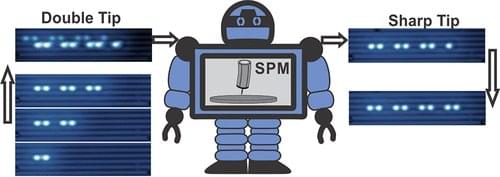Scientists at the University of Alberta have applied a machine learning technique using artificial intelligence to perfect and automate atomic-scale manufacturing, something which has never been done before. The vastly greener, faster, smaller technology enabled by this development greatly reduces impact on the climate while still satisfying the insatiable demands of the information age.
“Most of us thought we’d never be able to automate atomic writing and editing, but stubborn persistence has paid off, and now Research Associate Moe Rashidi has done it,” said Robert Wolkow, professor of physics at the University of Alberta, who along with his Research Associate has just published a paper announcing their findings.
“Until now, we printed with atoms about as efficiently as medieval monks produced books,” explained Wolkow. “For a long while, we have had the equivalent of a pen for writing with atoms, but we had to write manually. So we couldn’t mass produce atom-scale devices, and we couldn’t commercialize anything. Now that has all changed, much like the disruption following the arrival of the printing press for those medieval monks. Machine learning has automated the atom fabrication process, and an atom-scale manufacturing revolution is sure to follow.”
